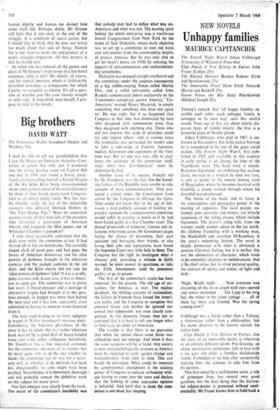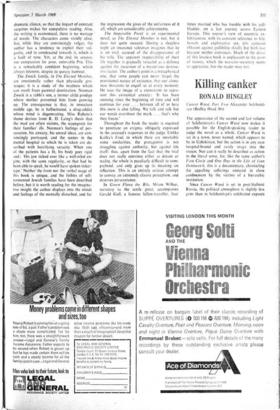NEW NOVELS
Unhappy families
MAURICE CAPITANCHIK
Clap Hands if You Believe in Fairies John Fraser (Collins 25s) The Elected Member Bernice Rubens (Eyre and Spottiswoode 25s) The Impossible Proof Hans Erich Nossack (Barrie and Rockliff 25s) Green Flows the Bile Jerzy Peterkiewicz (Michael Joseph 25s)
Tolstoy's remark that 'all happy families re- semble each other, each unhappy family is unhappy in its own way' suits this week's novels. Four out of five are about utterly dis- parate types of family misery; the first is a powerful piece of Nordic gloom.
Johan Falkberget, who died in 1967, is un- known in this country, but in his native Norway he is considered to be one of the great social realists. The Fourth Night Watch, first publ' lished in 1923 and available in this country . in early spring, is set during the time of the Napoleonic wars. The basic story is simple. Benjamin Sigismund. an ambitious but zealous cleric, married to a woman he does not love, is sent as pastor to the remote mining town of Bergstaden, where he becomes involved with Gunhild, a young woman through whom his downfall was prophesied.
The theme of the book, and its force, is the constructive and destructive power of the meeting of opposites. The local people, ex- tremely poor peasants and miners, are bitterly suspicious of the ruling classes, which include Sigismund. The pastor's ailing wife, from the warmer south, cannot adjust to the icy north. His lifelong friendship with a working man, the blacksmith and sacristan 01-Kanelesa, is the story's redeeming feature. The novel is deeply permeated with what is obviously a genuine Christian feeling, but it is neither this nor the delineation of character, which tends to be 'somewhat shadowy or melodramatic, that is Its chief virtue, but its vivid pictorial quality, the contrast of spring and winter, of light and dark :
'Night. Bright night . . . Now everyone was dreaming on his straw couch with eyes opened and senses awakened . . . The Lapp in his twig hut, the miner in his stone cottage . . . all of them lay there and listened. Was the spring coming now?'
Falkberget was a Verdi rather than a Tolstoy, a rhetorician rather than a philosopher, but his name deserves to be known outside his native land.
Clap Hands if You Believe in Fairies, also the story of an impossible desire, is otherwise in an entirely different idiom. Pru Gassing, an obese, unattractive adolescent, falls in love with a six year old child, a limbless thalidomide victim. Forbidden to see him after accidentally injuring him, she schemes to take him from his parents.
This first novel by a well-known actor, a tale of grotesque lives, has several very good qualities, not the least being that the distress- ful subject-matter is presented without senti- mentality. Mr Fraser knows how to hold back a,
dramatic climax, so that the impact of constant surprises makes for compulsive reading. Also, the writing is economical, there is no wastage of _words. The characters come vividly alive, but, while they are convincingly vulgar, the author has a tendency to exploit their vul- garity, and to condescend towards it, which is a fault of tone. Yet, at the end, he arouses our compassion for poor, unlovable Pru. This is a remarkably confident beginning, which always interests, despite its queasy humour.
The Zweck family, in The Elected Member, are emotionally rather than physically gro- tesque; it is a study of the madness which can result from parental domination. Norman Zweck is a rabbi's son, a former child prodigy whose mother prevented him from growing up. The consequence is that, in immature middle age, he is hallucinated, a drug-addict whose mind is degenerating. Miss Rubens's theme derives from R. D. Laing's thesis that the mad are often victims, the scapegoats for their families' ills. Norman's feelings of per- secution, his anxiety, his unreal ideas, are con- vincingly 'portrayed, and the scenes in the mental hospital to which he is taken are de- scribed with horrifying veracity. When one of the patients has a fit, his body goes rigid and: His jaw ticked over like a well-oiled en- gine, with the same regularity, so that had he been able to speak, he would have spoken ticker- tape.' Neither the form nor the verbal usage of this book is unique, and the foibles of self- tormented Jewish families have been described before, but it is worth reading for the imagina- tive insight the author displays into the minds and feelings of the mentally disturbed, and for
the impression she gives of the unfairness of it all, which are considerable achievements.
The Impossible Proof is an experimental novel, as The Elected Member is not, but it does not quite succeed. During a sleepless night an insurance salesman imagines that he is on trial, accused of the disappearance of his wife. The apparent respectability of their life together is gradually revealed as a defence against the incursion of a mysterious destruc- tive factor. The author's point is a metaphysical one, that some people can never forget the provisional nature of existence, that our alone- ness threatens to engulf us at every moment. He uses the image of a snowstorm to repre- sent this existential anxiety: It has been snowing since the beginning of time and will continue for ever . . . between all of us here this snow is also falling. We talk and talk but our words overshoot the mark . . . that's why they freeze.'
Throughout the book the reader is required to penetrate an enigma, obliquely expressed in the accused's responses to the judge. Unlike Kafka's Trial, to which there are inevitably some similarities, the protagonist is not struggling against authority, but against life itself; thus, apart from the fact that the trial does not really convince either as dream or reality, the whole is peculiarly difficult to com- prehend, and only gives up its meaning on reflection. This is an entirely serious attempt to convey an extremely elusive perception, and deserves perseverance.
In Green Flows the Bile, Miron Wilbur, secretary to the senile great, accompanies Gerald Gull, a famous fellow-traveller, four
times married who has trouble with his gall- bladder, on a last journey across Eastern Europe. This voyeur's view of eccentric ex- hibitionism, with its constant reference to bile. bowels and exploitative sex, pits cynicism (Miron) against gullibility (Gull), but both lose because neither convinces. Much of the dctai: of this loveless book is unpleasant to the point of nausea, which the narrator-secretary seems to appreciate. but the reader may not.



































 Previous page
Previous page